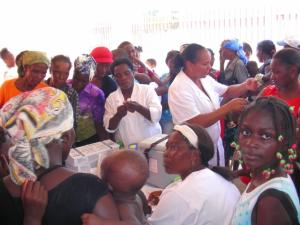Angola extends yellow fever vaccination campaign to Huambo and Benguela provinces
19 April 2016 – As Angola grapples with its worst yellow fever outbreak in decades, the Ministry of Health, with the support of the World Health Organization (WHO) and partners have extended the vaccination campaign beyond the capital Luanda into Huambo and Benguela – 2 of the other 5 provinces reporting local transmission.
Since the outbreak began in December 2015, 1908 suspected cases of yellow fever have been reported (617 laboratory confirmed) and 250 deaths have been reported. The majority of the cases are concentrated in Luanda and in two other provinces, namely, Huambo and Huila.
In order to contain the outbreak outside the capital, nearly 2.15 million people will be vaccinated in 5 densely populated urban districts in Huambo and Benguela provinces over the coming weeks. Around 1 million people in the 2 provinces have been vaccinated thus far.
“This targeted vaccination is critical to protect those most at risk countrywide and to stop the further spread of infection by making the best use of available global vaccine supplies”, said Dr Matshidiso Moeti, WHO Regional Director for Africa.
Since 2 February 2016, close to 6 million people in Luanda have benefited from a large-scale vaccination campaign using vaccines made available from the yellow fever vaccine emergency stockpile made available through the International Coordinating Group (ICG) for Vaccine Provision, with support from Gavi (the Vaccine Alliance); the UN Central Emergency Response Fund (CERF) and a vaccine donation from Brazil.
Along with the vaccination campaign, the Ministry of Health, WHO and partners are working to strengthen disease surveillance and diagnostic capacity, both within Angola and neighbouring countries, and enhance vector control, including using community-led public health education campaigns.
″The immediate concern is that the virus might spread to other urban centres in Angola and other countries. WHO urges all countries, especially those that border Angola, to increase disease surveillance and strengthen vector control as well as ensuring that all those travelling to Angola are vaccinated,” says Dr Bruce Aylward, Executive Director a.i., Outbreaks and Health Emergencies, WHO.
Vaccine supply
Angola’s outbreak has stretched existing yellow fever vaccine supplies. During outbreaks, available vaccine are prioritized for the emergency response. At the end of March 2016, thanks to ICG partners, including UNICEF, the yellow fever emergency vaccine stockpile was replenished and approximately 10 million doses of the vaccine are now available.
Concerns exist that if yellow fever should spread to other countries in Africa and Asia there would be a need to further prioritize vaccine supplies, which would interrupt routine immunization programmes in some countries.
“Stockpiling yellow fever vaccine has proved critical in combatting the current resurgence of the disease,” said Dr Seth Berkley, CEO of Gavi, the Vaccine Alliance. “With 12 million doses of vaccine, including 3 million for Angola, Gavi is the single biggest contributor to the emergency yellow fever stockpile. The current situation is a reminder of the importance of investing in strong and sustainable routine immunisation programmes to prevent such outbreaks and protect populations’ health.”
Strengthening international surveillance
Yellow fever cases in people who travelled from Angola have been reported in 3 countries China (11 cases), Democratic Republic of Congo (10 cases with 1 in Kinshasa) and Kenya (2 cases).
Three yellow fever cases have been reported in the south of Uganda. The patients had no travel history to Angola.
WHO is working with neighbouring countries such as the Democratic Republic of Congo (DRC), Namibia and Zambia to bolster cross-border surveillance with Angola and information sharing to prevent and reduce the spread of infection.
Travel advice
Vaccination is the single most important measure for preventing yellow fever. The vaccine is safe and highly effective and a single dose provides lifelong immunity.
The Government of Angola requires all travellers older than 9 months of age to show proof of yellow fever vaccination upon arrival. People who are traveling to Angola must ensure that they get vaccinated against yellow fever at least 10 days prior to travel. WHO advises travellers going to and from Angola and other countries where yellow fever occurs to get vaccinated and carry their certificate of vaccination when travelling.
About yellow fever
The yellow fever virus is transmitted by infected mosquitoes, the most common being the Aedes species – the same mosquito that spreads the Zika, chikungunya and dengue viruses. Mosquitoes become infected with the virus when they bite an infected human or monkey. The disease cannot be spread by contact from one person to another. Yellow fever is endemic in over 43 countries, in Africa and South America, with approximately 900 million people at risk.
Symptoms include fever, headache, jaundice, muscle pain, nausea, vomiting and fatigue. A small percentage of infected people experience a second, more severe phase of illness which includes high fever, jaundice and internal bleeding. At least half of severely affected patients who don’t receive treatment die within 10 to 14 days.
____________________________________________
For more information, please contact:
WHO Angola Country Office
Ebba Kalondo
Mobile: +244 930 443 582
Email: kalondoe [at] who.int (kalondoe[at]who[dot]int)
WHO Regional Office for Africa
Collins Boakye-Agyemang
Regional Communications Adviser
Communications Unit, Office of the Regional Director
Office: +242 47 241 39420
Mobile: +242 065 206 565
Email: boakyeagyemangc [at] who.int (boakyeagyemangc[at]who[dot]int)
WHO Geneva
Tarik Jašarević
Media Relations
Mobile: +41 793 676 214
Office : +41 22 791 5099
E-mail: jasarevict [at] who.int (jasarevict[at]who[dot]int)



